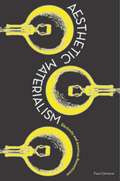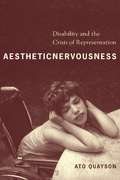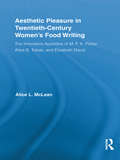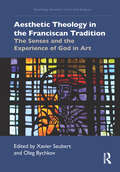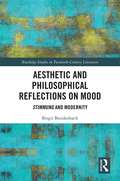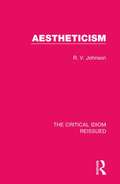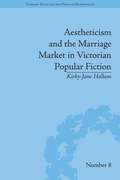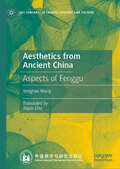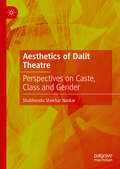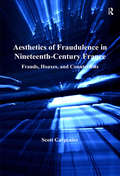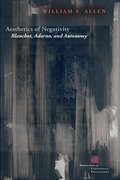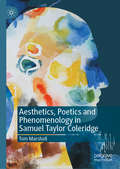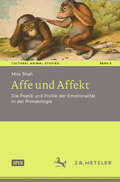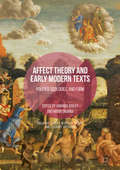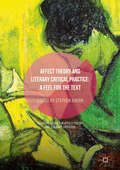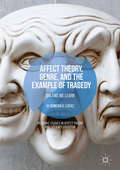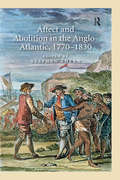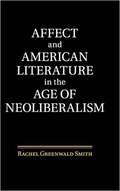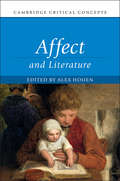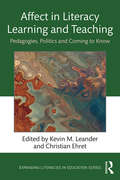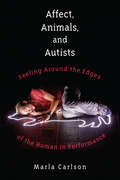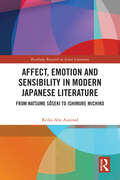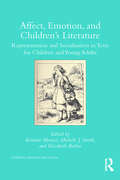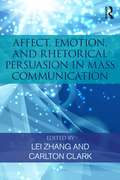- Table View
- List View
Aesthetic Materialism
by Paul GilmoreWalt Whitman's "Sing the Body Electric" metaphor from his epic Leaves of Grass poem stems from the technology of the time, according to Gilmore (English, California State U. , Long Beach). After tracing the term "aesthetics" back to Elizabeth Peabody's Aesthetic Papers (1849), he analyzes aesthetic images of electricity, the telegraph, and other technological developments from earlier British Romanticism to those of American Romantic writers including Whitman, Herman Melville, and Frederick Douglass. Portions of the chapter on Douglass were originally printed in a 2002 issue of the literary journal ATQ. Annotation ©2009 Book News, Inc. , Portland, OR (booknews. com)
Aesthetic Nervousness: Disability and the Crisis of Representation
by Ato QuaysonFocusing primarily on the work of Samuel Beckett, Toni Morrison, Wole Soyinka, and J. M. Coetzee, Ato Quayson launches a thoroughly cross-cultural, interdisciplinary study of the representation of physical disability. Quayson suggests that the subliminal unease and moral panic invoked by the disabled is refracted within the structures of literature and literary discourse itself, a crisis he terms "aesthetic nervousness." The disabled reminds the able-bodied that the body is provisional and temporary and that normality is wrapped up in certain social frameworks. Quayson expands his argument by turning to Greek and Yoruba writings, African American and postcolonial literature, depictions of deformed characters in early modern England and the plays of Shakespeare, and children's films, among other texts. He considers how disability affects interpersonal relationships and forces the character and the reader to take an ethical standpoint, much like representations of violence, pain, and the sacred. The disabled are also used to represent social suffering, inadvertently obscuring their true hardships.
Aesthetic Pleasure in Twentieth-Century Women's Food Writing: The Innovative Appetites of M.F.K. Fisher, Alice B. Toklas, and Elizabeth David (Routledge Studies in Twentieth-Century Literature)
by Alice McLeanThis book explores the aesthetic pleasures of eating and writing in the lives of M. F. K. Fisher (1908-1992), Alice B. Toklas (1877-1967), and Elizabeth David (1913-1992). Growing up during a time when women's food writing was largely limited to the domestic cookbook, which helped to codify the guidelines of middle class domesticity, Fisher, Toklas, and David claimed the pleasures of gastronomy previously reserved for men. Articulating a language through which female desire is artfully and publicly sated, Fisher, Toklas, and David expanded women’s food writing beyond the domestic realm by pioneering forms of self-expression that celebrate female appetite for pleasure and for culinary adventure. In so doing, they illuminate the power of genre-bending food writing to transgress and reconfigure conventional gender ideologies. For these women, food encouraged a sensory engagement with their environment and a physical receptivity toward pleasure that engendered their creative aesthetic.
Aesthetic Poetry
by Walter PaterTHE "aesthetic" poetry is neither a mere reproduction of Greek or medieval poetry, nor only an idealisation of modern life and sentiment. <P> <P> The atmosphere on which its effect depends belongs to no simple form of poetry, no actual form of life. Greek poetry, medieval or modern poetry, projects, above the realities of its time, a world in which the forms of things are transfigured. Of that transfigured world this new poetry takes possession, and sublimates beyond it another still fainter and more spectral, which is literally an artificial or "earthly paradise."
Aesthetic Theology in the Franciscan Tradition: The Senses and the Experience of God in Art (Routledge Research in Art and Religion)
by Xavier Seubert Oleg BychkovThe book investigates the aesthetic theology embedded in the Franciscan artistic tradition. The novelty of the approach is in applying concepts gleaned from Franciscan textual sources to create a deeper understanding of how art in all its sensual forms was foundational to the Franciscan milieu. Chapters range from studies of statements about aesthetics and the arts in theological textual sources to examples of visual, auditory, and tactile arts communicating theological ideas found in texts. The essays cover not only European art and textual sources, but also Franciscan influences in the Americas found in both texts and artifacts.
Aesthetic and Philosophical Reflections on Mood: Stimmung and Modernity (Routledge Studies in Twentieth-Century Literature)
by Birgit BreidenbachThis study explores the concept of Stimmung in literary and philosophical texts of the modern age. Signifying both 'mood' and 'attunement', Stimmung speaks to the categories of affective experience and aesthetic design alike. The study locates itself in the nexus between discourses on modernity, existentialism and aesthetics and uncovers the pivotal role of Stimmung in 19th- and 20th-century European narrative fiction and continental philosophy. The study first explores the philosophical and aesthetic origins and implications of Stimmung to, then, discuss its role in the narrative fiction of three key authors of modern literature: Fyodor Dostoevsky, Samuel Beckett and Thomas Bernhard. These readings demonstrate a significant shift towards an aesthetic of affective intensity and immediacy, in which the experience of the reading process takes centre stage as each author develops an aesthetic philosophy of Stimmung in their own right. Through its focus on the concept of Stimmung, the study thus unearths a fundamental link between existentialist concerns and narrative practice in modern literature.
Aestheticism (The Critical Idiom Reissued #3)
by R. V. JohnsonFirst published in 1969, this work explores aestheticism and its relationship with literature. After defining the term and examining the unique qualities of ‘the Aesthetes’, the book provides an overview of the literary movement from its emergence to its apotheosis in the 1890s. This book will be of particular interest to those studying 19th Century literature.
Aestheticism and the Marriage Market in Victorian Popular Fiction: The Art of Female Beauty (Literary Texts and the Popular Marketplace #8)
by Kirby-Jane HallumBased on close readings of five Victorian novels, Hallum presents an original study of the interaction between popular fiction, the marriage market and the aesthetic movement. She uses the texts to trace the development of aestheticism, examining the differences between the authors, including their approach, style and gender.
Aesthetics from Ancient China: Aspects of Fenggu (Key Concepts in Chinese Thought and Culture)
by Yonghao WangThis book presents the concept of Fenggu, one of the most important aesthetic categories of ancient China. As an inspiring aesthetic principle, it once encapsulated the particularities of various types of artistic creation and played an important role in traditional artistic creation and theoretic critique. The present volume aims to systematically elaborate on its etymological origin, connotations and generation, its great role in overcoming the tendency of creative stereotypes, its logical positioning in the ancient aesthetic system and its profound connection with traditional culture, via comprehensive analysis of a rich repository of original materials, in combination with calligraphy, painting, and poetry criticism. The theoretical character of traditional aesthetics has been derived from agglomeration of Fenggu with other several important categories of paradigm significance. Therefore, its investigation can offer insights into the organic rhythm of the development of ancient aesthetic thought and consequently lay a solid foundation for the construction of ancient art history and aesthetic history.
Aesthetics of Dalit Theatre: Perspectives on Caste, Class and Gender
by Shubhendu Shekhar NaskarSince Dalit theatre has not garnered as much recognition as the other genres of Dalit literature have, this book, being one of the pioneering works in the field, aims to highlight the genre within the framework of Dalit literature and the Dalit Movement in India. The discussion extensively delves into the historical background, context and aesthetics of Dalit drama and theatre from epistemological viewpoints. To illustrate the subtleties of caste, class and gender in the pan-Indian scenario, the book includes textual understandings of specific Dalit plays, available in English translation, originally written in Marathi, Tamil, Telugu, and Bengali, covering diverse regions of India. The inclusion of full-length interviews, conducted by the author, of all the living playwrights whose texts have been taken up for analysis, is another substantial facet of this study.
Aesthetics of Fraudulence in Nineteenth-Century France: Frauds, Hoaxes, and Counterfeits
by Scott CarpenterIn his engagingly written and original book, Scott Carpenter analyzes multiple manifestations of the false in nineteenth-century France. Under Carpenter's thorough and systematic analysis, fraudulence emerges as a cultural preoccupation in nineteenth-century literature and society, whether it be in the form of literary mystifications, the thematic portrayal of frauds, or the privileging of falseness as an aesthetic principle. Focusing particularly on the aesthetics of fraudulence in works by Mérimée, Balzac, Baudelaire, Vidocq, Sand, and others, Carpenter places these literary representations within the context of other cultural phenomena, such as caricature, political history, and ceremonial events. As he highlights the special relationship between literary fiction and fraudulence, Carpenter argues that falseness arises as an aesthetic preoccupation in post-revolutionary France, where it introduces a blurring of limits between hitherto discrete categories. This transgression of boundaries challenges notions of authenticity and sincerity, categories that Romantic aesthetics championed at the beginning of the nineteenth century in France. Carpenter's study makes an important contribution to the cultural significance of mystification in nineteenth-century France and furthers our understanding of French literature and cultural history.
Aesthetics of Negativity: Blanchot, Adorno, and Autonomy (Perspectives in Continental Philosophy)
by William S. AllenMaurice Blanchot and Theodor W. Adorno are among the most difficult but also the most profound thinkers in twentieth-century aesthetics. While their methods and perspectives differ widely, they share a concern with the negativity of the artwork conceived in terms of either its experience and possibility or its critical expression. Such negativity is neither nihilistic nor pessimistic but concerns the status of the artwork and its autonomy in relation to its context or its experience. For both Blanchot and Adorno negativity is the key to understanding the status of the artwork in post-Kantian aesthetics and, although it indicates how art expresses critical possibilities, albeit negatively, it also shows that art bears an irreducible ambiguity such that its meaning can always negate itself. This ambiguity takes on an added material significance when considered in relation to language as the negativity of the work becomes aesthetic in the further sense of being both sensible and experimental, and in doing so the language of the literary work becomes a form of thinking that enables materiality to be thought in its ambiguity.In a series of rich and compelling readings, William S. Allen shows how an original and rigorous mode of thinking arises within Blanchot’s early writings and how Adorno’s aesthetics depends on a relation between language and materiality that has been widely overlooked. Furthermore, by reconsidering the problem of the autonomous work of art in terms of literature, a central issue in modernist aesthetics is given a greater critical and material relevance as a mode of thinking that is abstract and concrete, rigorous and ambiguous. While examples of this kind of writing can be found in the works of Blanchot and Beckett, the demands that such texts place on readers only confirm the challenges and the possibilities that literary autonomy poses to thought.
Aesthetics, Poetics and Phenomenology in Samuel Taylor Coleridge
by Tom MarshallThis book re-evaluates the philosophical status of Samuel Taylor Coleridge by providing an extended comparison between his work and the phenomenological theory of Edmund Husserl. Examining Coleridge’s accounts of the imagination, perception, poetic creativity and literary criticism, it draws a systematic and coherent structure out of a range of Coleridge’s philosophical writing. In addition, it also applies the principles of Coleridge’s philosophy to an interpretation of his own poetic output.
Affe und Affekt: Die Poetik und Politik der Emotionalität in der Primatologie (Cultural Animal Studies #6)
by Mira ShahDiese Open-Access-Publikation mit dem Titel "Affe und Affekt" untersucht anhand populärwissenschaftlicher Forschungsmemoiren die Form und Funktion von Emotionen, Affekten und Gefühlen in der Feldforschung mit Affen – und wie gerade Literatur und Film das Verhältnis von Mensch, Affe und Affekt für die Wissenschaft produktiv reflektieren und analysieren. Der Mensch ist evolutionär betrachtet ein Affe unter anderen. Doch nennt er sich selbst homo sapiens, die anderen Affen im besten Fall die ‚Menschenaffen‘ - sonst aber pans, pongos oder papios. Diese Unterscheidung ist nur ein kleines Puzzlestück in einer emotionsgetriebenen Rhetorik der Primatologie, der Wissenschaft von den Affen.
Affect Theory and Early Modern Texts: Politics, Ecologies, and Form (Palgrave Studies in Affect Theory and Literary Criticism)
by Amanda Bailey Mario DigangiThe first book to put contemporary affect theory into conversation with early modern studies, Affect Theory and Early Modern Texts: Politics, Ecologies, and Form demonstrates how questions of affect illuminates issues of cognition, political agency, historiography, and scientific thought in early modern literature and culture. Engaging various historical and theoretical perspectives, the essays in this volume bring affect to bear on early modern representations of bodies, passions, and social relations by exploring: the role of embodiment in political subjectivity and action; the interactions of human and non-human bodies within ecological systems; and the social and physiological dynamics of theatrical experience. Examining the complexly embodied experiences of leisure, sympathy, staged violence, courtiership, envy, suicide, and many other topics, the contributors open up new ways of understanding how Renaissance writers thought about the capacities, pleasures, and vulnerabilities of the human body.
Affect Theory and Literary Critical Practice: A Feel for the Text (Palgrave Studies in Affect Theory and Literary Criticism)
by Stephen AhernAffect Theory and Literary Critical Practice develops new approaches to reading literature that are informed by the insights of scholars working in affect studies across many disciplines, with essays that consider works of fiction, drama, poetry and memoir ranging from the medieval to the postmodern. While building readings of representative texts, contributors reflect on the value of affect theory to literary critical practice, asking: what explanatory power is affect theory affording me here as a critic? what can the insights of the theory help me do with a text? Contributors work to incorporate lines of theory not always read together, accounting for the affective intensities that circulate through texts and readers and tracing the operations of affectively charged social scripts. Drawing variously on queer, feminist and critical race theory and informed by ecocritical and new materialist sensibilities, essays in the volume share a critical practice founded in an ethics of relation and contribute to an emerging postcritical moment.
Affect Theory, Genre, and the Example of Tragedy: Dreams We Learn (Palgrave Studies in Affect Theory and Literary Criticism)
by Duncan A. LucasAffect Theory, Genre, and the Example of Tragedy employs Silvan Tomkins’ Affect-Script theory of human psychology to explore the largely unacknowledged emotions of disgust and shame in tragedy. The book begins with an overview of Tomkins’ relationship to both traditional psychoanalysis and theories of human motivation and emotion, before considering tragedy via case studies of Oedipus, Hamlet, and Death of a Salesman. Aligning Affect-Script theory with literary genre studies, this text explores what motivates fictional characters within the closed conditions of their imagined worlds and how we as an audience relate to and understand fictional characters as motivated humans.
Affect and Abolition in the Anglo-Atlantic, 1770–1830
by Stephen AhernAt the turn of the nineteenth century, writers arguing for the abolition of the slave trade and the emancipation of those in bondage used the language of sentiment and the political ideals of the Enlightenment to make their case. This collection investigates the rhetorical features and political complexities of the culture of sentimentality as it grappled with the material realities of transatlantic slavery. Are the politics of sentimental representation progressive or conservative? What dynamics are in play at the site of suffering? What is the relationship of the spectator to the spectacle of the body in pain? The contributors take up these and related questions in essays that examine poetry, plays, petitions, treatises and life-writing that engaged with contemporary debates about abolition.
Affect and American Literature in the Age of Neoliberalism
by Rachel Greenwald SmithRachel Greenwald Smith's Affect and American Literature in the Age of Neoliberalism examines the relationship between American literature and politics in the twentieth- and twenty-first centuries. Smith contends that the representation of emotions in contemporary fiction emphasizes the personal lives of characters at a time when there is an unprecedented, and often damaging, focus on the individual in American life. Through readings of works by Paul Auster, Karen Tei Yamashita, Ben Marcus, Lydia Millet, and others who stage experiments in the relationship between feeling and form, Smith argues for the centrality of a counter-tradition in contemporary literature concerned with impersonal feelings: feelings that challenge the neoliberal notion that emotions are the property of the self.
Affect and Literature (Cambridge Critical Concepts)
by Alex HouenThis book considers how 'affect', the experience of feeling or emotion, has developed as a critical concept within literary studies in different periods and through a range of approaches. Stretching from the classical to the contemporary, the first section of the book, 'Origins', considers the importance of particular areas of philosophy, theory, and criticism that have been important for conceptualizing affect and its relation to literature. Includes ancient Greek and Roman philosophy, eighteenth-century aesthetics, Marxist theory, psychoanalysis, queer theory, and postcolonial theory. The chapters of the second section, 'Developments', correspond to those of the previous section and build on their insights through readings of particular texts. The final 'Applications' section is focused on contemporary and future lines of enquiry, and revolves around a particular set of concerns: media and communications, capitalism, and an environment of affective relations that extend to ecology, social crisis, and war.
Affect in Literacy Learning and Teaching: Pedagogies, Politics and Coming to Know (Expanding Literacies in Education)
by Kevin M. Leander Christian EhretIn this cutting-edge volume, scholars from around the world connect affect theory to the field of literacy studies and unpack the role and influence of this emerging area of scholarship on literacy education. Offering an introduction to affect theory and scholarship as it relates to literacy studies, contributors discuss the role of humanizing and dehumanizing influences on schooling and examine the emotional and affective dimensions at individual and communal levels. Arguing that an affective turn requires a radical rethinking of the nature of literacy, these chapters address the impact and import of emotion and affect on reading, writing and calling to action. Grounded in trailblazing research, the contributors push the boundaries of academic writing and model how theoretically-driven writing about affect must itself be moving and expressive.
Affect, Animals, and Autists: Feeling Around the Edges of the Human in Performance
by Marla CarlsonWhen theater and related forms of live performance explore the borderlands labeled animal and autism, they both reflect and affect their audiences’ understanding of what it means to be human. Affect, Animals, and Autists maps connections across performances that question the borders of the human whose neurodiverse experiences have been shaped by the diagnostic label of autism, and animal-human performance relationships that dispute and blur anthropocentric edges. By analyzing specific structures of affect with the vocabulary of emotions, Marla Carlson builds upon the conception of affect articulated by psychologist Silvan Tomkins. The book treats a diverse selection of live performance and archival video and analyzes the ways in which they affect their audiences. The range of performances includes commercially successful productions such as The Curious Incident of the Dog in the Night-Time, War Horse, and The Lion King as well as to the more avant-garde and experimental theater created by Robert Wilson and Christopher Knowles, Back to Back Theatre, Elevator Repair Service, Pig Iron Theatre, and performance artist Deke Weaver.
Affect, Emotion and Sensibility in Modern Japanese Literature: From Natsume Sôseki to Ishimure Michiko (Routledge Research on Asian Literature)
by Reiko Abe AuestadThis book takes the unique approach of combining cognitive approaches with more established close-reading methods in analysing a selection of Japanese novels and a film.They are by four well-known male authors and a director (Natsume Sôseki, Shiga Naoya, Ôe Kenzaburô, Ibuse Masuji and Imamura Shôhei) and five female authors (Kirino Natsuo, Kawakami Mieko, Murata Sayaka, Tsushima Yûko, and Ishimure Michiko) from the early twentieth century up to the early millennium. It approaches the different artistic strategies that oscillate between emotional immersion and critical reflection. Inspired by new developments in cognitive theory and neuroscience, the book seeks to put a spotlight on the aspects of modern Japanese novels that were not fully appreciated earlier; the eclectic and fluid nature of the novel as a form, and the vital roles played by affects and emotions often complicated under the impact of trauma.Rejuvenating previously established cultural theories through a cognitive and emotional lens (narratology, genre theory, historicism, cultural study, gender theory, and ecocriticism), this book will appeal to students and scholars of modern literature and Japanese literature.
Affect, Emotion, and Children’s Literature: Representation and Socialisation in Texts for Children and Young Adults (Children's Literature and Culture)
by Kristine Moruzi Michelle J. Smith Elizabeth BullenThis volume explores the relationship between representation, affect, and emotion in texts for children and young adults. It demonstrates how texts for young people function as tools for emotional socialisation, enculturation, and political persuasion. The collection provides an introduction to this emerging field and engages with the representation of emotions, ranging from shame, grief, and anguish to compassion and happiness, as psychological and embodied states and cultural constructs with ideological significance. It also explores the role of narrative empathy in relation to emotional socialisation and to the ethics of representation in relation to politics, social justice, and identity categories including gender, ethnicity, disability, and sexuality. Addressing a range of genres, including advice literature, novels, picture books, and film, this collection examines contemporary, historical, and canonical children’s and young adult literature to highlight the variety of approaches to emotion and affect in these texts and to consider the ways in which these approaches offer new perspectives on these texts. The individual chapters apply a variety of theoretical approaches and perspectives, including cognitive poetics, narratology, and poststructuralism, to the analysis of affect and emotion in children’s and young adult literature.
Affect, Emotion, and Rhetorical Persuasion in Mass Communication
by Lei Zhang Carlton ClarkThis volume examines the interplay between affect theory and rhetorical persuasion in mass communication. The essays collected here draw connections between affect theory, rhetorical studies, mass communication theory, cultural studies, political science, sociology, and a host of other disciplines. Contributions from a wide range of scholars feature theoretical overviews and critical perspectives on the movement commonly referred to as "the affective turn" as well as case studies. Critical investigations of the rhetorical strategies behind the 2016 United States presidential election, public health and antiterrorism mass media campaigns, television commercials, and the digital spread of fake news, among other issues, will prove to be both timely and of enduring value. This book will be of use to advanced undergraduates, graduate students, and active researchers in communication, rhetoric, political science, social psychology, sociology, and cultural studies.
